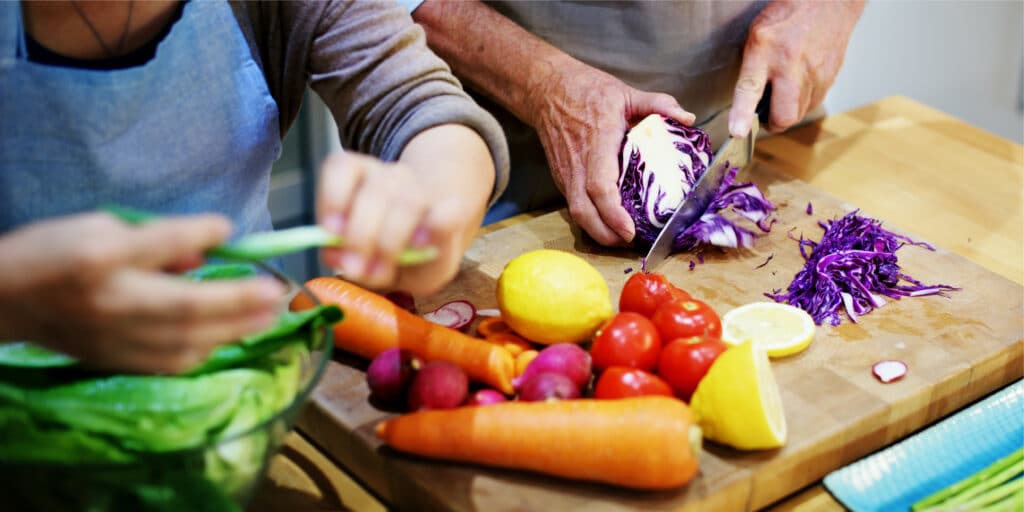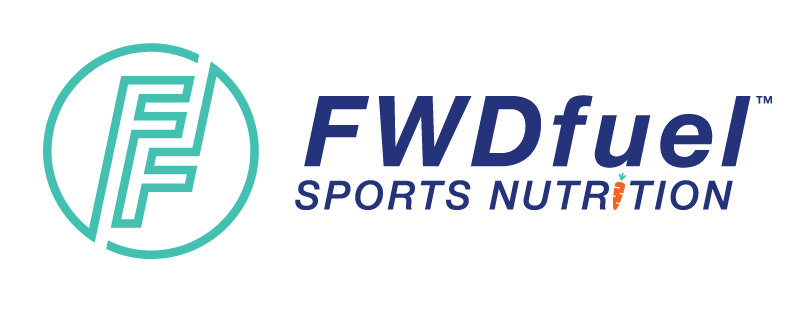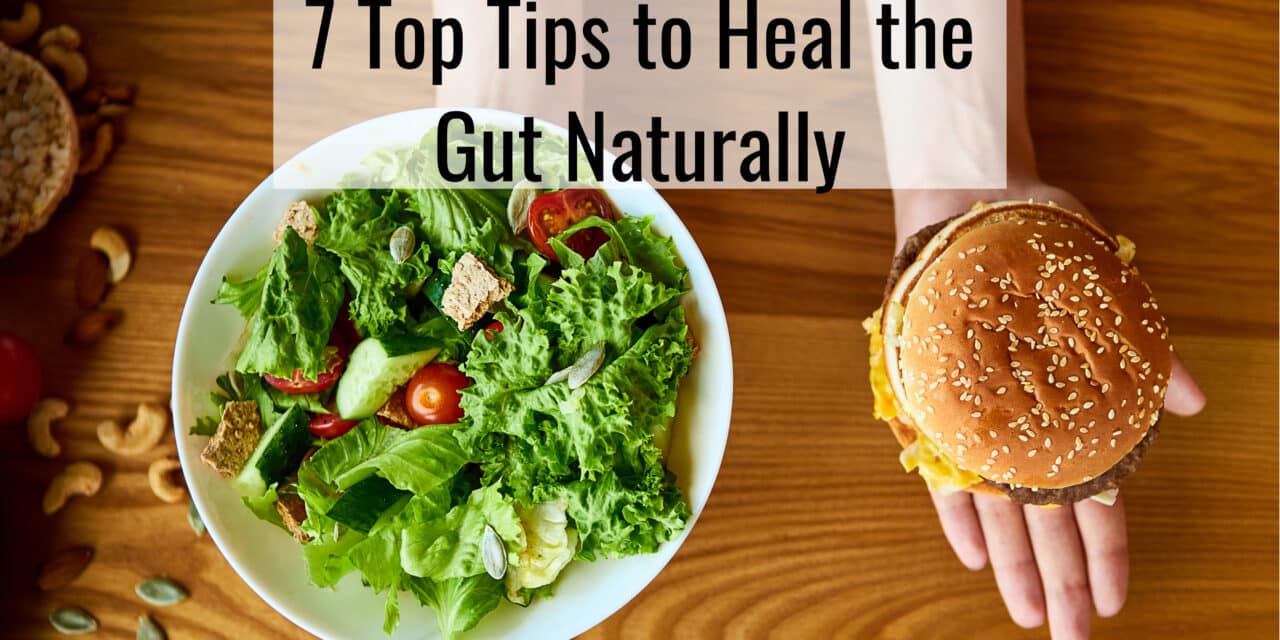Alright friends, this is a lesson you won’t want to sleep through! It’s time to discuss the 7 top tips to heal the gut naturally.
Most of you reading this article probably experience bloating, gas, diarrhea, stomach pain or constipation on a weekly if not daily basis. (Friendly reminder: Constipation = you don’t have at least one, ideally two bowel movements daily.)
So, why not try to tackle these symptoms on your own before relying on medication or procedure?
It is incredible the number of clients we see who deal with gut issues and have gone through test after test, colonoscopy, endoscopy, – you name it- only to have everything come back “normal” Why does this happen? Because most of the time the issue starts with and ends with changing diet and incorporating a supplement or two.
If your interest is piqued, keep reading because today we will be reviewing how to heal the gut naturally as well as the best foods for gut health.
Table of contents
Gut Health 101
First, let’s run through a quick little refresher on inflammation.
Our body’s inflammatory response is a very helpful and critical process. When we experience injury or infection, our body’s immune system kicks in, sending special messengers to kill off pathogens infecting our cells. The messengers also create a space of healing and equilibrium once again. Think of this more as a “spot treatment” situation.
Chronic inflammation on the other hand, from poor diet and lifestyle choices, is a result of the body’s inability to fight constant damage over time. This is what ultimately leads to a severe gut microbial imbalance and ultimately disease.
Wondering why severe gastrointestinal imbalance is so hazardous to health? After all, scientists once thought digestion was a simple process where food essentially shoots down a long tube from the mouth to the anus and voila, done! Why would you and I have reason to think any differently?
Why Gut Health is Important for More Than Just Digestion
Well, taking a few steps back, the gut microbiome encompasses more than 10 trillion microbial cells from approximately 1,000 different species of bacteria. All of these microorganisms are attempting to play nice in the sandbox, AKA your digestive tract. These gut microbes interact with their host (our body) and work to stay in balance via cell-to-cell signaling. The gut microbes are also responsible for the release of antimicrobial proteins. The proteins, or peptides if you will, regulate most of the work performed in the cells of our body and are critical for the regulation, structure, and function of our tissues and organs.[1] When everything is balanced, our body is happy and in check. In other words, we feel energized and free of disease or pain.
While a select few of these little microbes are harmful to health, the vast majority are unbelievably beneficial and their balance is completely necessary if we want to stay afloat when it comes to cancer, depression, autoimmune disease, and chronic pain.
Therefore, it should be no surprise to you that when gut integrity is compromised from junk food, stress, environmental toxins, and medications,(AKA intestinal permeability) and this beautiful microbial balance is thrown off, we begin to see food allergies, bloating, pain, constipation, gas and then years down the line, chronic disease.[2]
If you’d like to learn more about leaky gut AKA intestinal permeability, how it occurs and what you can do to fix it, we have everything you need to know in our Ultimate Guide to Heal Leaky Gut Syndrome Fast.
How Long Does it Take to Heal the Gut Naturally?
Rome was not built in a day and the same goes for your intestinal lining.
Remember, it took years for your gut to get to the state that it is in, so it is only natural that it may take 3-6 months of consistent changes (sometimes longer) in order to rebuild and repair the magnificent structure. With that said, most people feel better and/or notice fairly significant improvement after 3 months.
That may seem like a long time, but get this: Our intestines are the most highly regenerative organ in the body and the cells of our intestinal lining regenerate themselves every 3-5 days!!!! That is incredible when you think about it and that fact should provide you with great hope when you are working to make difficult lifestyle changes.[3]
Please also keep in mind that you must get to the root of your health issues in order to experience true success and optimal health. If your gut is in a state of turmoil due to eating garbage and taking NSAIDs, antibiotic meds or reflux meds for years, then you are likely to notice a world of difference after following our steps to heal the gut naturally.
If you are dealing with more serious health issues such as heavy metal toxicity or Lyme Disease, for example, you will need to work with a qualified practitioner to address these issues in addition to our gut healing protocol.
Alright, let’s get started!
(Usual disclaimer: FWDfuel Sports Nutrition is a participant in the Emerson Wellevate Associates program as well as the Amazon Services LLC Associates Program, an affiliate advertising program designed to provide a means for sites to earn advertising fees by advertising and linking to amazon.com.)

The 7 Top Ways to Heal your Gut Naturally Are:
1. Avoid Sugar
While avoiding sugar is certainly much easier said than done, it is one of the most critical steps we need to take in order to repair our intestinal lining.
Sugar is one of the most inflammatory carbohydrates on the planet.[4]
Sure, you may not be eating candy bars and drinking milkshakes all day, but, what about your juice, granola bars, sports drinks, yogurt, hamburger buns etc.? Hidden sugar is E.V.E.R.Y.W.H.E.R.E. and you must be on the lookout at all times.
You also might think, “Well who cares, I only intake a very small amount of added sugar calories each day, so I don’t see the big fuss.” While that is a very logical thought, the danger with sugar consumption is not so much the calories, at least not when we are speaking about gut health. Instead, the concern comes from the changes it can have on our gut bacterial balance.
A consistent intake of sugar, even in small amounts, can cause such an imbalance in your gastrointestinal system. Sugar selectively feeds your “bad” bacteria so much that you may start to notice sugar cravings and even hunger in general increase.
The bad bacteria being fed are responsible for minor annoyances such as acne and fatigue as well as major annoyances such as changes to our brain. One study actually showed that consuming a diet high in processed sugar was associated with an impaired hippocampus, the part of our brain that is responsible for mood, memory, and emotion.[5]
By following a whole-food, anti-inflammatory diet, by nature, you will be following a diet that does not include added sugar!
Looking for a little extra assistance in this department? Check out our suggestion for our favorite sweet swaps (healthy substitutions for junk food).
2. Avoid Artificial Sweeteners
It was once thought that artificial sweeteners were harmless because they passed through the digestive system intact.
We should have known that was too good to be true.
Recent research tells us that artificial sweeteners may have the ability to change our gut bacteria in a negative fashion. And, as referenced earlier in the article, this is not advantageous to long term health.
While on the whole, the studies are somewhat inconclusive, science is trending in the direction of microbial imbalance and it’s always best to stay ahead of the curve.[6] (Check out our article on artificial sweeteners to learn more about their side effects.)
If you are craving something sweet from time to time, use real food to sweeten or alter the taste in your dish. Great options include cinnamon, unsweetened applesauce, banana, pure maple or local honey.
3. De-stress Accordingly and Sleep Appropriately
It is not possible to heal the intestinal lining without adequate sleep and relaxation. Consider starting and ending your day with 10 minutes of guided meditation (we personally use the app Headspace but there are options out there including the app Calm). Aim for at least 7 hours of sleep whenever you can and try using our favorite blue light blocking glasses 2 hours before bed.
4. Supplement Accordingly
The right supplements can make all the difference in the world when paired with the best foods for gut health. No question, these are the two pieces needed to heal the gut naturally.
It may seem confusing when you read numerous articles regarding the best ways to heal your gut with supplements. This is partly because there are a number of ways to “skin a cat”. In an effort to streamline it all, we are going to briefly list the best supplements to heal the gut naturally and why.
L-Glutamine: This magical amino acid has been shown over and over again that it can repair existing damage and prevent future damage of our GI lining. [7] We recommend good old-fashioned L-glutamine by Pure Encapsulations. It blends easily and does not taste or smell like anything. Ideally, you would take this on an empty stomach. 5g/day is maintenance while 20g is best for repair. As always, check with your doctor or dietitian first to see what is best for your current health situation.
Marshmallow Root and Deglycerrhizinated Licorice: These are adaptogenic herbs that improve acid function, decrease inflammation of the stomach lining, stimulate the production of protective mucous, and reduce digestive pain.
Let’s be honest, we are all about efficiency and taking the least amount of supplements possible, so we would strongly suggest purchasing GI Revive by Designs for Health as it contains l-glutamine in addition to marshmallow root and deglycerrhizinated licorice. Take on an empty stomach between meals. Your doctor or dietitian will determine your dose.
Digestive Enzymes: Digestive enzymes are useful for their ability to help our body fully digest our meals. Unfortunately, the act of digestion is often sacrificed when our intestinal lining is in trouble. This also helps with the digestion and removal of toxic particles from food and the outside world that might be harming our lining. Our favorite is UltraDigestzyme by Pure Encapsulations. Take as directed by your doctor or dietitian.
A Gut Detox Binder: This is critical for assisting your body with the binding and removal of toxins that damage the lining. We highly recommend GI Detox by Bio-Botanical Research as it is gentle yet extremely effective.
Quercetin and vitamins A and D are also beneficial for immune health and gut repair. We would suggest double-checking your multivitamin to make sure it contains A and D. If you are in need of a suggestion, we like O.N.E by Pure Encapsulations and our favorite quercetin supplement is made by Thorne.
Pro Tip: The above supplement links are for Amazon, however, our insider secret is to search and purchase from Wellevate, a site that offers professional-grade supplements at discounted prices. FWDfuel readers will receive 20% off all orders and free shipping over $49 when they click on our links to create their account. Unfortunately, we cannot provide direct links to products with Wellevate (which is why we provide Amazon links), but a quick search is all you need to find great products at a discounted price.
If you want to learn more about how to set up an account and use Wellevate, check out our video here:
Next, tips 5,6, and 7 will branch off Into the best foods for gut health.
The Top Foods for Gut Health
5. Incorporate Probiotics
Probiotics are critical when it comes to promoting microbial balance in our gastrointestinal tract. These live organisms maintain proper gut function and digestion by preventing the invasion of harmful microbes, eliminating toxins, improving the synthesis and absorption of the food we eat, and supporting a healthy metabolism.[8]
The most natural way to ingest probiotics is by means of fermented foods. These are undoubtedly some of the very best foods for gut health! If you’d like to learn more, check out our article about the best fermented foods.
In terms of probiotic supplementation for gut health, your first priority should be to choose a probiotic with multiple strains (ideally at least 8-10). We recommend that you work with your doctor or dietitian to decide what is best for you.
Generally speaking, the best strains include Saccharomyces boulardii, Lactobacillus casei and the Bifidobacterium species. The latest studies have shown that Lactobacillus rhamnosus GG is very beneficial when it comes to repair.[9]
In terms of a probiotic for gut repair, we have seen the most success with MegaSporebiotic by Microbiome Labs. Interested in 10% off? Buy direct from Microbiome Labs and use this link to create your account for 10% off all purchases for life.
If you’d like to dive deeper into the world of probiotics, check out our posts the top probiotic supplements, the best probiotic strains for each gut type, and lastly, the best time to take probiotics.
6. Don’t Forget Prebiotics
Think of prebiotics as performance fuel for probiotics. One cannot be successful without the other! Prebiotics are a natural form of soluble fiber that feed the good bacteria located in our large intestine (bowel).
When we consume prebiotic-rich foods, the good bacteria recognize them as premium fuel and chow down. This results in the production of beneficial short-chain fatty acids such as butyrate. Put simply, this process is VERY IMPORTANT because it maintains the integrity of our gastrointestinal lining and inhibits the growth of disease-fighting pathogens.
If you’d like to learn more about the best sources of prebiotics, check out our article on the best prebiotic food and supplements.

Putting it Altogether to Heal The Gut Naturally
7. Eat a Diet Made of Whole Foods
Try your very best to remove inflammatory foods such as gluten, dairy, and sugar for at least 3 months while attempting to reseal your intestinal lining. Think of it this way, these foods inflame/irritate your body (joints, muscles, brain, etc) and intestinal lining so what good is it to consume prebiotics, probiotics, high-end supplements etc. to heal when you are following it up with toxic foods? Pointless. Not to mention, a huge waste of time and money!
While the removal of comfort foods such as those containing gluten, dairy, and sugar seems scary at first, 98% of our clients say they feel significantly better 2-3 weeks into the removal, that they are excited to keep going.
In case you are feeling a little overwhelmed, after reading all of these tips, here is what a “dream day” might look like when it comes to incorporating everything we mentioned in this article.
Dream Day:
Breakfast:
- Veggie omelet with 1-2 TBSP guac on top (salsa is optional) + side of fruit
- Take a multivitamin with breakfast
- GI Revive on empty stomach between meals
- WORKOUT + Post Recovery Shake
Lunch:
- Digestive enzymes before meal
- Grilled chicken + sweet potato + salad + EVOO (Bonus for adding a few tablespoons of sauerkraut onto your salad)
- “Snack”: GI Revive on an empty stomach between meals
Dinner
- Digestive enzyme before the meal
- Salmon + brown rice + green veggies
- Take a probiotic with dinner
- Dessert: Strawberries dipped in natural almond butter
- GI Detox Binder on empty stomach before bed
These are undoubtedly some of the very best foods for gut health!

_____
So there we have it, my friends, for the best ways to heal your gut and a highlight of the very best foods for gut health. If you would like to dig deeper into the essential foods for gut healing, we have an entire post written on the topic of The Best Foods for Gut Health which includes some of our favorite foods and snacks that we eat regularly to keep our guts strong and balanced.
If you want to turbo charge healing your gut, adding a poweful gut healing powder can also be effective.
Achieving a greater state of health and well-being is at your fingertips. All it takes is a little self-study and consistency with your approach, and you will be there in no time! While having discipline is tough, once you start to feel better, you won’t want to turn back. So, stay focused, you can do this!
References:
- https://www.ncbi.nlm.nih.gov/pmc/articles/PMC3983973/
- https://www.ncbi.nlm.nih.gov/pmc/articles/PMC4425030/
- https://www.ncbi.nlm.nih.gov/pmc/articles/PMC5818549/
- https://www.ncbi.nlm.nih.gov/pmc/articles/PMC5986486/
- https://www.ncbi.nlm.nih.gov/pmc/articles/PMC5277010/
- https://www.ncbi.nlm.nih.gov/pmc/articles/PMC6363527/
- https://www.ncbi.nlm.nih.gov/pmc/articles/PMC4369670/
- https://www.bmj.com/content/361/bmj.k2179
- https://www.ncbi.nlm.nih.gov/pubmed/7552958








